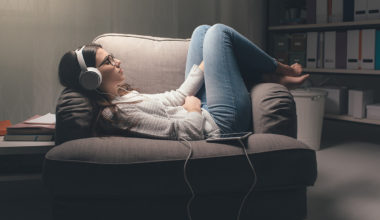A poor night’s sleep affects us all occasionally, and therapists are not immune. We, too, experience sleepless nights when stress keeps us tossing and turning. We’re also just as vulnerable to the effects of the habits that lead to poor sleep.
Admittedly, therapists have an advantage in fighting sleep problems because we know a little more about how sleep works. Good sleep depends on your routines and habits — known as sleep hygiene — your physical needs, your mental functioning, and sometimes, medical intervention. Let’s look at each of these four pillars of good sleep more deeply and learn more about what therapists try when sleep eludes us.
Sleep Hygiene
Good sleep habits, or sleep hygiene, are among the most important changes you can make if you aren’t getting enough shut eye. There are many different ways you could create good sleep habits, depending on what works best for you. Commonly, the following are good ways to start.
- Set a consistent sleep/wake time
Going to bed and getting up at the same time every day helps your body know when it’s time to sleep. Trying to get up and go to bed at the same time each day will help you sleep more soundly through the night and eliminate trouble falling asleep. Keeping this routine can be beneficial even on weekends — try to get up at a similar time, even if it means taking a nap later in the day. - Maintain a sleep-promoting space
Distractions like a laptop, TV, phone, or anything else that keeps you from sleeping, can signal to your body that you should be doing things other than sleeping. When your bedroom cues you for sleep, not wakefulness, it can be easier to fall asleep at the end of the day. Limiting other activities in the bedroom, such as working on a laptop or watching TV, means your bedroom sends the signal to your brain to sleep, not toss and turn. - Leave bed when you can’t sleep
If you can’t sleep, don’t toss and turn too long, instead just get out of bed. Although this may seem counter-intuitive, it’s important to maintain the sanctity of bed as a place of rest, rather than worry and restlessness.
Physical Needs
In addition to creating good habits around sleep, there are physical things we can all do, as well as avoid, in order for our bodies to rest well. While this list of needs may seem overwhelming, start implementing one or two at a time, and over a few weeks begin to layer in more so that they’ll become habit.
Here are six habits to try to improve your sleep:
- Minimize stimulating activities before bedtime
Stimulating activities like working out or hanging out with friends too close to bed can disrupt both your ability to get a good night’s sleep. The quality of sleep you experience can also be impacted. - Limit caffeine and alcohol intake
Both alcohol and caffeine can disrupt sleep for many people. In addition, caffeine builds up in your system throughout the day. It needs time to diminish. When you cut back, it may be a little while before you see improvements. - Limit late-night eating
When you eat, your body has to process the food — it can’t just wait for a more convenient time. This means if you’re trying to sleep, your body can’t fully rest until it has finished the work of digestion. In addition, eating just before lying down can aggravate acid reflux and keep you awake. - Minimize blue light exposure before bedtime
Blue light from electronic screens appears to reduce melatonin production, which is the brain’s natural sleep-inducing hormone. While limiting these activities is best, it may not always be realistic. The use of blue light filtered glasses is becoming increasingly more common to combat eye strain and promote healthy sleep. - Get enough time outside
Exposure to natural daylight keeps your biological clock ticking properly. This can be especially important in the winter, when daylight is scarcer. - Be active
Exercise improves your overall health, so while it doesn’t guarantee effortless rest, it minimizes problems that could affect sleep. While exercising too close to bedtime can be an inhibitor of sleep, being active during the day is the best way to reap the benefits of exercise without impacting your sleep.
Mental Needs
Sometimes, even for therapists, our thoughts are our biggest barrier to sleep. Maybe it’s a client dealing with significant challenges or just the to-do list — but therapists have a lot on their minds that can keep them from slumber. We all know the feeling though, you feel exhausted, but as soon as you lie down, your busy thoughts ramp up. Before you know it, you worry about being awake, further activating those distracting thoughts. Before you know it, you’re in a loop. Sleep seems impossible. There are a few ways to help settle your mind. You might try relaxation strategies, evaluate your stress management skills, or try working with a therapist.
Relaxation strategies
Various relaxation strategies help you override the brain’s mental activity. Practice several different techniques to find a combination that works for you. Guided meditation and white noise tracks, that can often help with relaxing before bed, are readily available online or via apps. Progressive muscle relaxation might also work for you.
Stress management
See if you can cut back any activities or responsibilities to reduce your mental load. If not, sometimes it can help to spend a limited time period planning your next day. Keep planning time short, though, just to clear your head, rather than obsess about details. If you’re overwhelmed by all you have on your plate, try making a to-do list before bed, so your mind is no longer concerned with forgetting or racing around with these thoughts. Before bed, you might try journaling as an outlet for what’s on your mind or stressing you out.
Work with a therapist
If sleep problems persist despite these efforts, therapy may help. A therapist can give you structured relaxation and stress management strategies individualized to your specific situation. In addition, simply talking to someone, even a friend, can alleviate stress. Often, cognitive behavioral therapy (CBT) can help with sleep problems by changing your thought patterns regarding sleep.
Medical Interventions
Sometimes medical interventions are necessary, especially if physical conditions disrupt your sleep. If you haven’t found success with other strategies, like the ones mentioned above, the next best step is checking with your doctor to see if there’s something else going on.
A doctor can help you both identify medical conditions that may cause your sleep issues and prescribe medication if necessary. Conditions such as sleep apnea, thyroid problems, restless leg syndrome, or painful conditions such as arthritis can all disrupt sleep. Getting proper medical care is essential in these cases.Some mental health conditions such as post-traumatic stress disorder or depression may also affect sleep. Sleep disorders such as narcolepsy or sleepwalking can disrupt nighttime patterns. Medication can address underlying problems or temporarily improve sleep while working to regulate other conditions.
Sleep problems can be miserable even if, like a therapist, you know what to do. Fortunately, many sleep problems are temporary and improve when you address overall physical and mental health. Working with a therapist can help you manage and overcome your sleep problems by discovering and getting at the root of the problem. If you’re ready to start sleeping better, try online therapy today.
Talkspace articles are written by experienced mental health-wellness contributors; they are grounded in scientific research and evidence-based practices. Articles are extensively reviewed by our team of clinical experts (therapists and psychiatrists of various specialties) to ensure content is accurate and on par with current industry standards.
Our goal at Talkspace is to provide the most up-to-date, valuable, and objective information on mental health-related topics in order to help readers make informed decisions.
Articles contain trusted third-party sources that are either directly linked to in the text or listed at the bottom to take readers directly to the source.




